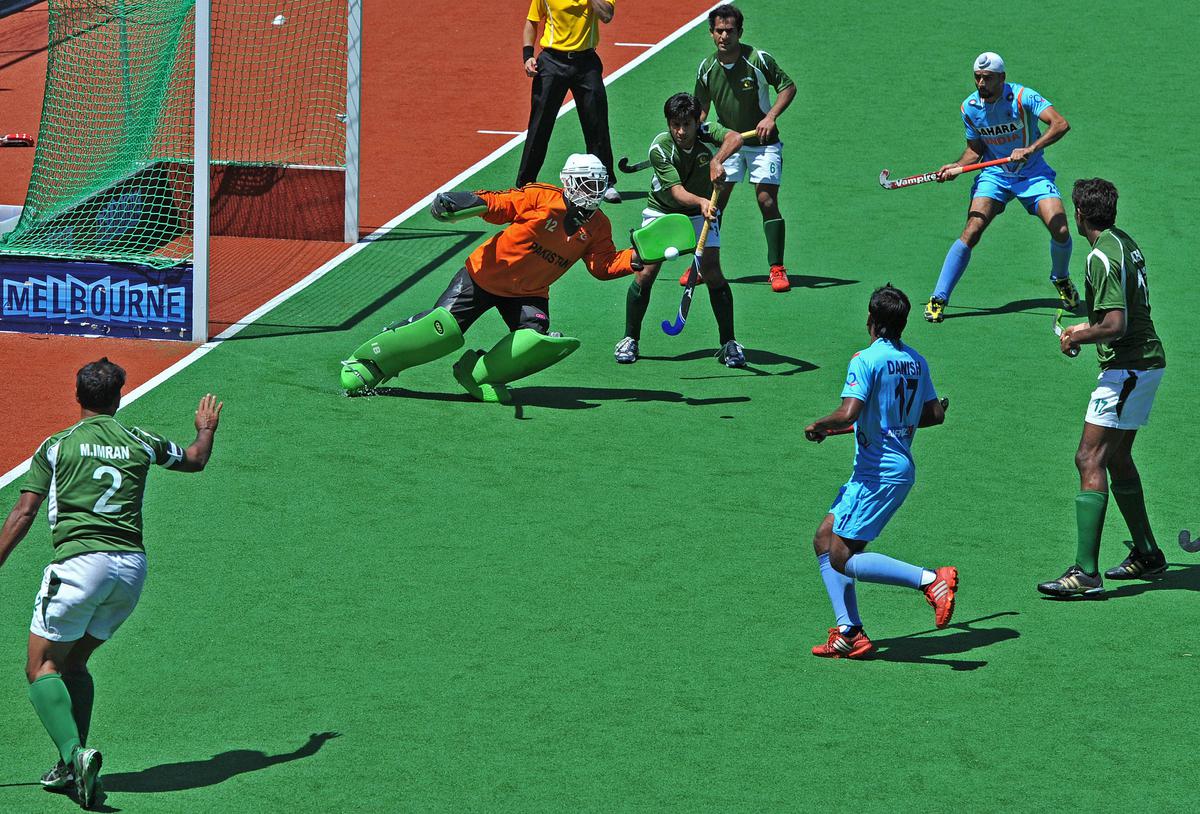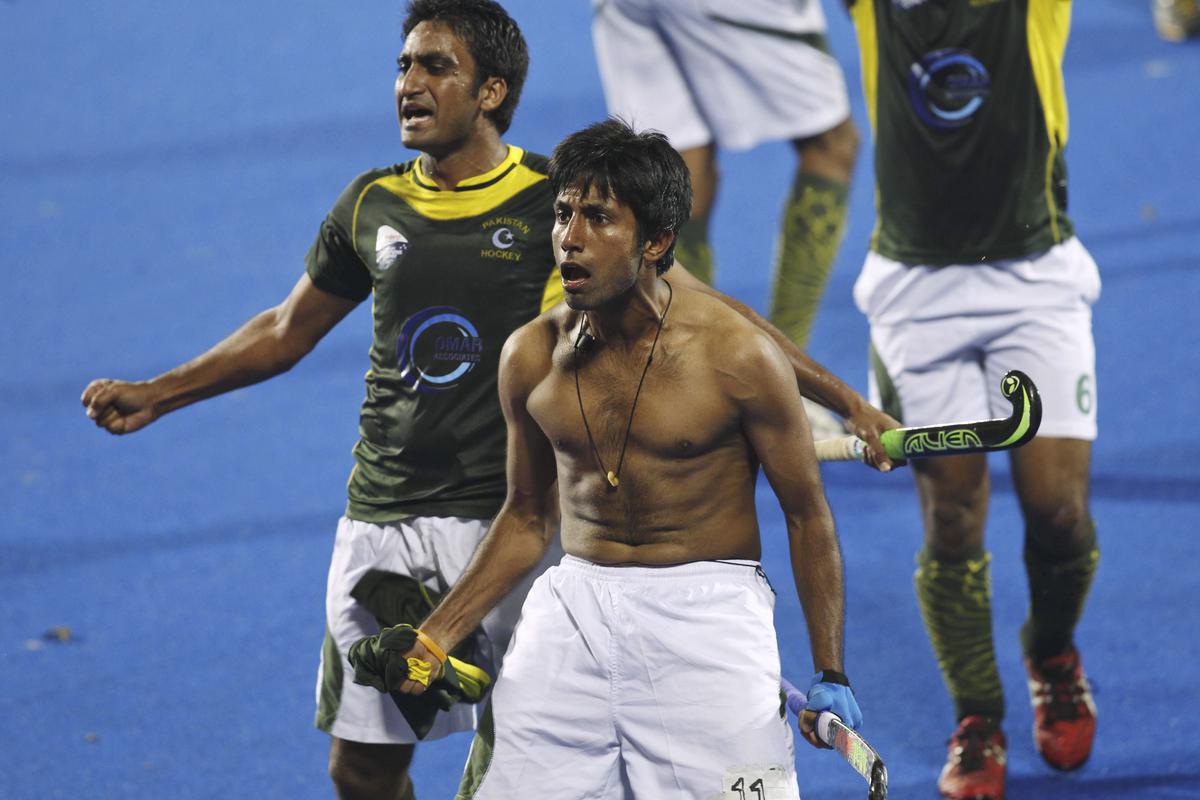On a late winter day, the Indian men’s hockey team arrived in Rawalpindi to face Pakistan.
A hat-trick of wins for the Green Shirts—two in Chandigarh and one in Jalandhar—meant the fate of the six-match Test series was nearly sealed by the time the caravan had crossed the border.
A 1-1 draw in Lahore turned Pakistan’s lead unassailable before India got its first win in Faisalabad.
The Rawalpindi game was a dead rubber. But an India-Pakistan game is seldom confined to just that. The archrivals, somehow, always call for an added pinch of spice. Just enough to cook up a thriller.
That is what happened at the Army Hockey Stadium on February 26, 2006. Pakistan went 3-0 ahead, courtesy of goals from Tariq Aziz, Muhammad Saqlain, and Shabbir Khan.
The home team’s comfortable cushion got punctured in the 54th minute, with Sandeep Singh converting a short corner. Tejbir Singh chipped one into the net, six minutes later. Three minutes from the final hooter, Vishnu Pillay earned a draw for India.
What made this six-goal extravaganza special was that it was the last of its kind. For the delicacy that the India-Pakistan contests are, it went cold after that Test series.
From 1978 to 2006, India and Pakistan played eight Test series before diplomatic ruckus spilled over to see the trend come to an abrupt halt. Talks to reinstate Tests surfaced in 2013 before being drowned out by political resistance.
The treat is now limited to international and continental competitions, such as the Asian Champions Trophy match on Wednesday. The games, still feisty, offer edge-of-the-seat thrills at times, but they are few and far between. The fact that Pakistan is in the middle of a transition does not help either.
Ask any former international, and they’d give their vote for a Test series between India and Pakistan.
“It is necessary that we play (Tests). India and Pakistan have not been able to get rid of each other for the last 70 years. Sau saal baad bhi ikkathe hee rahenge (A hundred years from now we’ll still be together).
“Make every possible effort to improve our relations. Aur sport se toh kabhi relation bigadta hee nahi hai (Sport can never deteriorate diplomatic relations),” said former India captain Rajpal Singh.
Then India captain Rajpal Singh and Paksitan’s Muhammad Imran vie for the ball during the 2010 World Cup.
| Photo Credit:
R.V. Moorthy/The Hindu
Then India captain Rajpal Singh and Paksitan’s Muhammad Imran vie for the ball during the 2010 World Cup.
| Photo Credit:
R.V. Moorthy/The Hindu
Rajpal featured in the 2006 Test series and scored in India’s only win. The encounter he savours the most, though, is the penalty shootout win in the 2011 Asian Champions Trophy final.
“2011 was the first edition of the Asian Champions Trophy in China. India and Pakistan played in the final. At that time, a lot of young players were in the side and I was the captain,” recalled Rajpal.
ALSO READ: Asian Champions Trophy 2023 hockey: Pakistan turns to mind games before clash against India
Pakistan holds the bragging rights in head-to-head records. In the 172 games between the two, across competitions, Pakistan outdoes India 82-64. It has more wins in the Olympics, Asian Games, and Asia Cup. India leads 3-2 in the World Cups but Pakistan makes up with its five titles to India’s one.
In the Asian Champions Trophy, however, India leads 6-2. This clear edge, Rajpal feels, stems from the inaugural gold under his charge.
Rajpal’s advocacy to resume Tests is echoed by one of his counterparts too.
Imran Butt, a former goalkeeper and captain, won silver at the Champions Trophy and Asian Games with Pakistan.
“There is a barrier set. As sportspersons, we will have to break it. Ultimately, hockey suffers due to India and Pakistan not playing. Whenever the two teams play, the game is intense and closely fought. Cricket bhi khelein aapas mei, hockey bhi khelein (Play cricket and hockey both). If other teams can play, then why not us?” Butt told Sportstar.

Imran Butt of Pakistan deflects the ball in front of goal during the bronze medal match against India at the men’s Champions Trophy tournament in Melbourne on December 9, 2012.
| Photo Credit:
AFP PHOTO/Paul CROCK
Imran Butt of Pakistan deflects the ball in front of goal during the bronze medal match against India at the men’s Champions Trophy tournament in Melbourne on December 9, 2012.
| Photo Credit:
AFP PHOTO/Paul CROCK
Butt and Rajpal belong to different generations. The former debuted in 2012, the latter’s final year on the international stage. Yet the recollections of their respective trips across the border reflect an unvarying warmth held in place by intertwining cultures, and, of course, the love for hockey.
ALSO READ: After missing chance to play together, brothers Rehan and Imran unite to steer Pakistan hockey again
“When we went to India, we got a lot of love. Obviously, on the field we were competitive, but off it, we were good friends. Our language and culture are pretty similar, so we always maintain a good friendship,” said Butt.
“I went for the first time in 2006. The way they showed love and welcomed us – it was nice. Their hospitality was generous,” recounted Rajpal.
Even with the mutual respect between teams, unruly moments created chinks in the rivalry from time to time. Butt has had first-hand experience.
In 2012, Butt, a part of Mumbai Magicians in the Hockey India League, was among the Pakistani players released after a Mumbai-based party opposed their participation.
Two years later, Butt was part of a Pakistani team that drew flak after two of its players – Muhammad Tousiq and Ali Amjad – were suspended for displaying obscene gestures at the Bhubaneswar crowd after its semifinal win against India in the Champions Trophy.
ALSO READ: When is India vs Pakistan hockey match in Hangzhou Asian Games 2023?
“It should not have happened. We are somewhat ambassadors of peace. The reaction was going to come from both sides after that. The FIH president back then, Narinder Batra, had his say. Even our federation made a statement.
“These incidents create misunderstandings. And that crowd support went against us in the final against Germany, which cost us. Had the incident not happened, I knew the crowd would have supported us,” Butt said.

In this Saturday, December 13, 2014 photo, Pakistan’s Muhammad Tousiq, centre, takes off his shirt and gestures towards the crowd as his teammates celebrate their victory over India in the Champions Trophy semifinal in Bhubaneswar. The FIH, having investigated the matter, handed one-match bans to Tousiq and Ali Amjad following the 4-3 win. The international body had initially refused to take action despite terming the behavior as “beyond acceptable standards.”
| Photo Credit:
BISWARANJAN ROUT/AP
In this Saturday, December 13, 2014 photo, Pakistan’s Muhammad Tousiq, centre, takes off his shirt and gestures towards the crowd as his teammates celebrate their victory over India in the Champions Trophy semifinal in Bhubaneswar. The FIH, having investigated the matter, handed one-match bans to Tousiq and Ali Amjad following the 4-3 win. The international body had initially refused to take action despite terming the behavior as “beyond acceptable standards.”
| Photo Credit:
BISWARANJAN ROUT/AP
But when Pakistan returned to the city in 2018 for the World Cup, all was forgiven, he added.
Despite political friction between the nations, Butt remains a staunch propagator for more India-Pakistan games. He hopes the game in Chennai leads by example in making it a reality.
“The game in Chennai will be in a slightly different environment, but it will be a closely fought contest. The more we play, the better. Whatever misunderstandings we have between us might get resolved,” he said.



